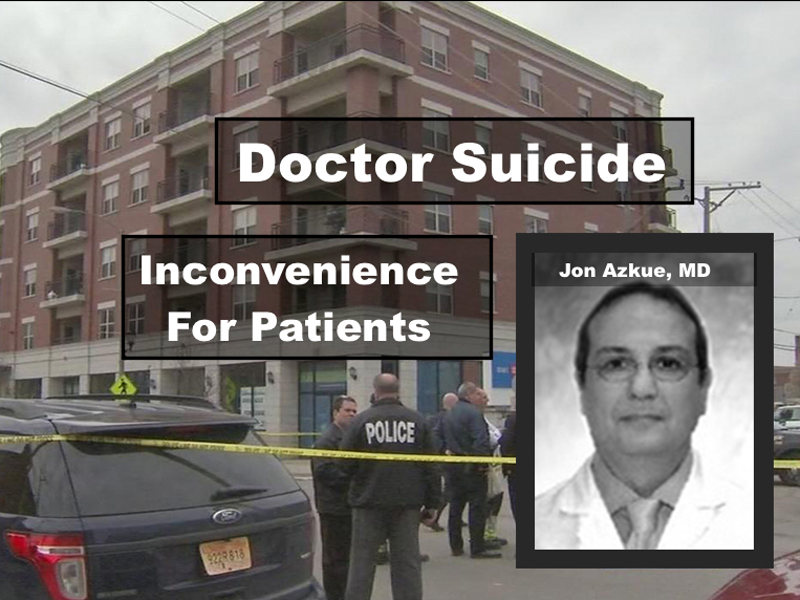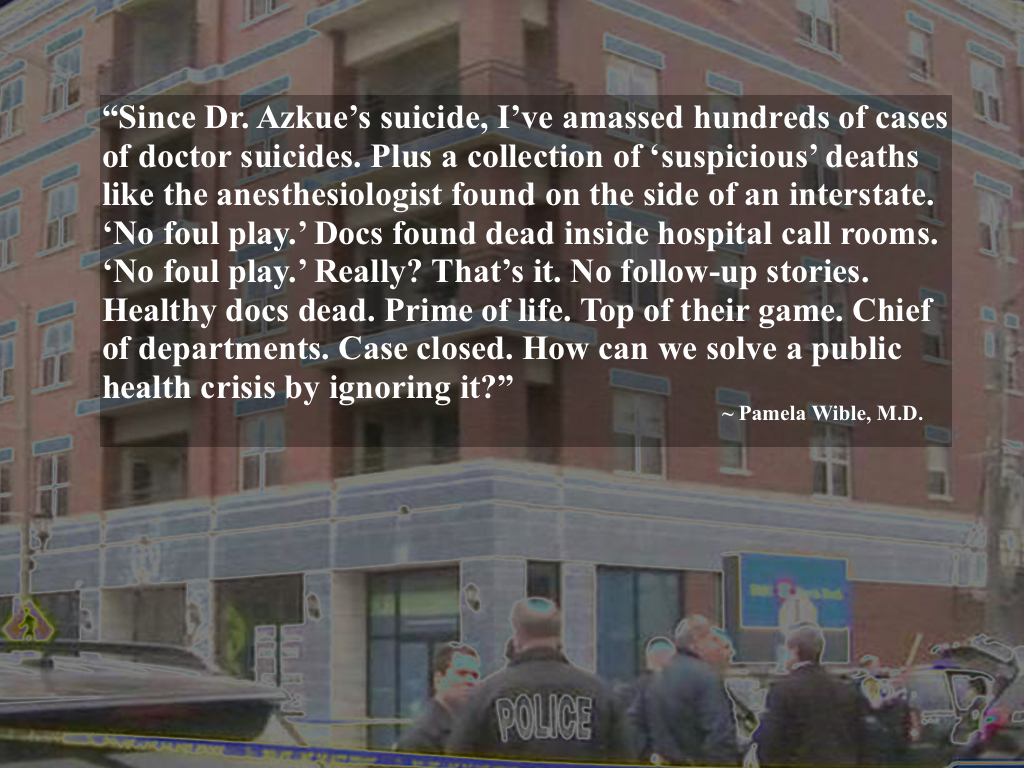Why did a story about a doctor suicide focus on the inconvenience caused to patients?
Jon Azkue, a Chicago-area doctor, died by suicide just before completing his training. I first reported his death a few years ago. This is a follow-up story on his suicide. What really happened to Dr. Azkue? And why?
Two years ago, on April 20, 2005, I first read the headline: Police: Doctor found dead near hospital in Berwyn. Immediately, I published an article on Dr Azkue’s suicide. The next day, ABC news changed the title of the story to “Man found dead near hospital in Berwyn.” How does a dead doctor get demoted to a “man” found dead?
Here are the facts: On April 16, a maintenance worker calls police for a well-being check on a tenant, Dr Jon Azkue, a 54-year-old physician employed at MacNeal Hospital. Police discover a suicide note and his decomposed body surrounded by helium tanks. Thinking they were propane tanks, police call the bomb squad and evacuate the four-story building which houses health professionals and medical businesses. Here’s how his neighbours and colleagues respond:
“I was actually going to get some baby food,” says Jemin George who evacuated the building with his family. “My daughter is in one of the vehicles and it’s been almost three hours since she’s had something to eat.”
“It’s an inconvenience for the patients,” claims Riz Ahmed, an employee at Chicagoland Retinal Consultants, a clinic located in the building. Clinic manager Anna Futya, is also frustrated by the inconvenience. “All the calls that are coming here—whether from patients or doctors—nobody is able to answer …”
Wait, I thought this news story was about the doctor. The original headline clearly states: “Doctor found dead near hospital.” So why is the focus now on patient inconvenience? How did Dr Azkue get scrubbed from his own story?
Dr Azkue’s death is not only reported as an inconvenience to patients, he is treated as if he is guilty of a crime. There’s no sympathy, no sadness for the loss of a man who spent his life helping others. In the comments—amid jokes about terrorist plots and remarks about the selfishness of suicide—one doctor writes:
Wow. I’m appalled by the lack of sensitivity for the loss of life here. I myself am in residency and unless you live through it, you cannot begin to imagine the stress and sacrifices that we and our families endure—far greater than missed eye appointments. My condolences to his family and colleagues. The journalist and editor should be ashamed of the slant through which they allowed this ‘news’ to be delivered.
 I’m compelled to discover the truth. Turns out Jon Azkue is a 1994 foreign medical graduate from Central University of Venezuela who was just a few months from completing his final year of internal medicine residency at MacNeal Hospital. Though he was a physician in Venezuela, his dream was to practice medicine in the United States. So what happened? Why would he kill himself just months before fulfilling his dream?
I’m compelled to discover the truth. Turns out Jon Azkue is a 1994 foreign medical graduate from Central University of Venezuela who was just a few months from completing his final year of internal medicine residency at MacNeal Hospital. Though he was a physician in Venezuela, his dream was to practice medicine in the United States. So what happened? Why would he kill himself just months before fulfilling his dream?
Physician suicide often leads to more questions than answers. In the US we lose more than 400 physicians each year to suicide. Like most docs, Jon Azkue left a note. Why aren’t we analysing these suicide notes for common themes to prevent more suicides? Why aren’t these suicides fully investigated? Why does it seem like nobody cares when a doctor dies by suicide?
Since the bomb squad left his apartment, we’ve heard nothing more about Dr Azkue. We’ve heard nothing about lives he saved. This was his five minutes of fame. Nearly two years later and we still have no answers as to why, no investigation of his residency program (where I’ve been told other doctors have attempted and died by suicide). Sadly, my prediction that this doctor would be forgotten by the media and medical profession has come true. Are his years of dedication not even worth a plaque on a wall? Are doctors so disposable?
Since Dr Azkue’s suicide, I’ve amassed hundreds of cases of doctor suicides. Plus a collection of “suspicious” deaths like the anesthesiologist found on the side of an interstate. “No foul play.” Docs found dead inside hospital call rooms. “No foul play.” Really? That’s it. No follow-up stories. Healthy docs dead. Prime of life. Top of their game. Chief of departments. Case closed. How can we solve a public health crisis by ignoring it?
Here’s the truth: One million Americans lose their doctors to suicide each year. Until we investigate why so many doctors are dying by suicide, we’ll continue to lose more doctors to suicide. Maybe if we took a sincere interest in Dr Azkue’s death, we could prevent the next one.
Meanwhile the only public honoring of Dr Azkue appears to be on my blog where co-workers share: I knew Dr Azkue and worked with him. Shame on the public for their insensitivity to this situation. Unless you know the whole story, people, think before you speak! You never know what someone else has gone through! Who are we to judge? May he rest in peace. I worked with him also and found him to be a kind doctor. He was very nice and very intelligent and it breaks my heart to see that he passed away.
Even Dr Azkue’s son, Jon Mikel, reached out from Mexico to search for answers about the unusual circumstances surrounding his father’s death.
He was in fact fired on his third year of the residency (just a few months before graduating). The hospital didn´t tell us why exactly. He lost his visa status as a result and would have had to leave the country. We are from Venezuela, and its bad over there, really bad. That must have devastated him, as his dream, since I have memory, was to live and practice medicine in the states specially because he did his first two years of med school in Boston. He could not finish back then for financial reasons, so he went on to finish med school in Venezuela and was a doctor over there several years. After Chavez though, he committed himself to his dream of practicing medicine in the states. It took him years. We thought he had finally made it… By the way, my family went through his stuff, they found two job offers for when he finished in August as well as few good letters of recommendation. A relative spoke to the program director. We still don’t understand why he was fired. They told us it was a decision taken by a board, nothing that could be done there. But wouldn’t give us the why.
Now it’s 2017 and we still don’t know why. I do know of several residency programs that have a habit of firing final year residents just months form graduation. I’ve seen the victims vilified and careers destroyed. Any investigation into these programs? Not that I’m aware of.
In summary, a physician is sacrificed by his profession and the media chooses a patient inconvenience angle. Why? Wendy Eidman explains the unusual and callous reporting of this story:
So I used to be in television news (both an anchor and reporter); I can tell you exactly why this story was written the way it was. When the reporter got to the scene, she was not doing a human interest piece, which is the kind of story that you want to listen to. She covered a breaking news story, a situation that was unfolding — a possible explosive device in the building, the disruption of the residents’ lives, the consequences to the businesses involved, and the discovery of a victim in an apartment that had been rented to a physician, cause of death undetermined at the time of broadcast. It was appropriately done with the information that the reporter had at the time she had to go live. When I was in TV, it was station policy to not cover suicides in general unless the suicide had some consequence to the public — a person stepping in front of a train, causing the system to shut down for a time during rush hour, for example; in those cases, the story itself was the disruption of service to customers during rush hour. Management for my station felt that if they did allow coverage for suicides, the publicity might encourage suicidal people to go through with their plans. Since the reporter in this particular story had already gone live, it would have been good to follow up with the kind of story that you are envisioning once the coroner released the report that the doctor had indeed completed suicide. It would have been an awesome opportunity to do a series on the issue of physician suicide and the general state of medical care in America. I am going to hashtag the TV station so that they can read this comment and perhaps follow through during May ratings.
Physician suicide is a public health crisis, yet there has still been no follow-up story. No major media investigation. So I’ll continue to report on these suicides myself—and I will continue to honor our fallen physicians.
Pamela Wible, M.D., reports on human rights violations in medicine. She is the author of Physician Suicide Letters—Answered.
This blog was originally published on www.idealmedicalcare.org




